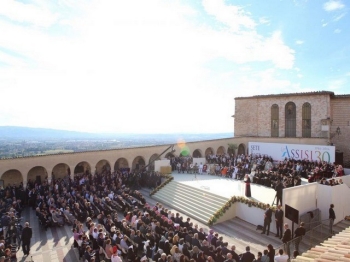To bring about encounters through dialogue: Thirst for Peace, Assisi 2016

"This is the spirit that animates us: to bring about encounters through dialogue, and to oppose every form of violence and abuse of religion which seeks to justify war and terrorism [...]Nothing is impossible if we turn to God in prayer. Everyone can be an artisan of peace. Through this gathering in Assisi, we resolutely renew our commitment to be such artisans, by the help of God, together will all men and women of good will". These words from the 2016 appeal for peace, signed on September 20 by the religious leaders gathered in Assisi during the closing ceremony of the "Thirst for Peace” meeting, summarize the central points of the three days of dialogue and prayer, which were sponsored by the Diocese of Assisi, the Franciscan Family and the Community of Sant'Egidio to mark the 30th anniversary of the first Day of Prayer for Peace, held on October 27, 1986.
Before the signing of the appeal, the Ecumenical Patriarch of Constantinople, Bartholomew I, clearly traced the traits of peace: "There can be no peace without respect and mutual recognition, there can be no peace without justice, there can be no peace without effective cooperation between all the peoples of the world". His message also contained a response to the question of what justice really is:" Justice has to be consistent with what we profess and believe, but able to dialogue with each other, capable of seeing the value of others, incapable of overpowering others, of feeling superior or inferior of our neighbor. Justice is ensuring that people may continue to live in the land of their ancestors, in peace and love, that they may return to their homeland for the growth of human society. "
The importance of prayer was strongly echoed in the address given by Pope Francis: " Prayer and the desire to work together commit us to a true peace that is not illusory: not the calm of one who avoids difficulties and turns away, if his personal interests are not at risk; it is not the cynicism of one who washes his hands of any problem that is not his; it is not the virtual approach of one who judges everything and everyone using a computer keyboard, without opening his eyes to the needs of his brothers and sisters, and dirtying his hands for those in need”.
References were made to the current situation in the Middle East. Before the speeches of the religious leaders, the Assembly heard the testimony of Tamar Mikalli, a young woman from Aleppo who arrived in Italy through the humanitarian corridors. Her words conveyed a sadness not only at having to leave her homeland but also at the attempts to cause divisions between Christians and Muslims when before there were none in the freedom to profess their faith that everyone enjoyed.
During the Christian ecumenical prayer that took place before the closing ceremony, a candle was lit for the various countries whose populations are living in situations of conflict. One of the last was lit for the Holy Land, so dear to the Knights and Dames of the Holy Sepulchre.
In this context, on Sept. 19 a panel discussion was dedicated to "Interreligious coexistence in Israel." The auxiliary bishop of the Latin Patriarchate of Jerusalem for Israel, Msgr. Giacinto Boulos Marcuzzo spoke on behalf of the Catholic Church. In his intervention, he outlined three levels of dialogue that are particular to the Holy Land. First, dialogue around the Word of God that if, on the one hand, shows how the very idea of dialogue comes from Revelation, from the dialogue between God and man, on the other hand rarely enters into issues related to justice given the problematic nature and sensitivity of the situation between the various communities. More precisely dialogue in this Land is connected to the Holy Places which represent a unique opportunity for man and God to draw close to each other. Finally, we must not forget the dialogue of the pilgrims who, belonging to a particular religious tradition, treasure the experience of being in a land that is also holy for other communities.
Concluding with the words of Rabbi Daniel Sperber, of Bar Ilan University in Israel, Jerusalem "should and could be a venue for constructive dialogue, between mutually appreciative religious representatives, who are fully aware of the enormous dangers of "wars of religions", and who seek both a theologically and a pragmatic Modus Vivendi leading to a peace and harmony for which all well-wishers truly yearn. And in this way will the prophecy of Isaiah be fulfilled, as he wrote (56:7):
"Even them will I bring to My holy Mountain
and make them joyful in My house of prayer: …
for mine house shall be called
a house of prayer for all people."
Elena Dini
(21 settembre 2016)



